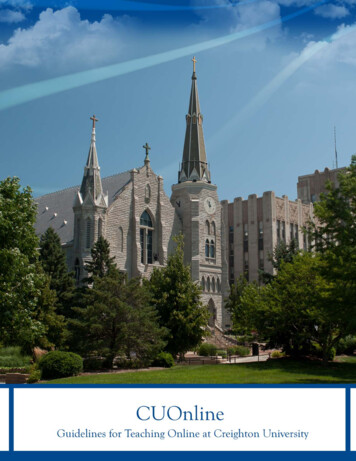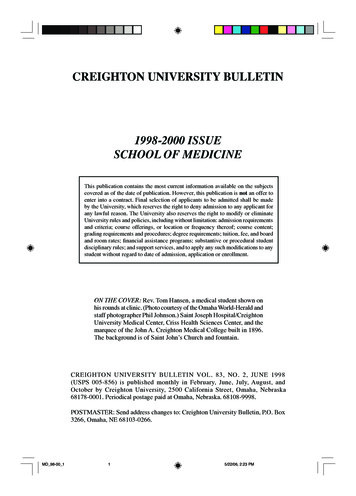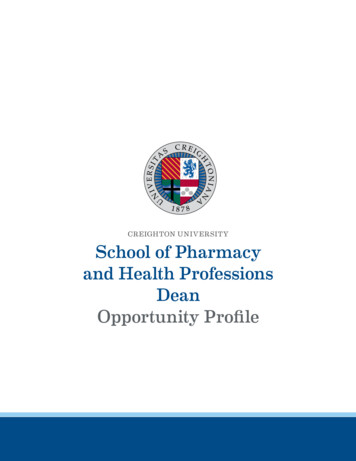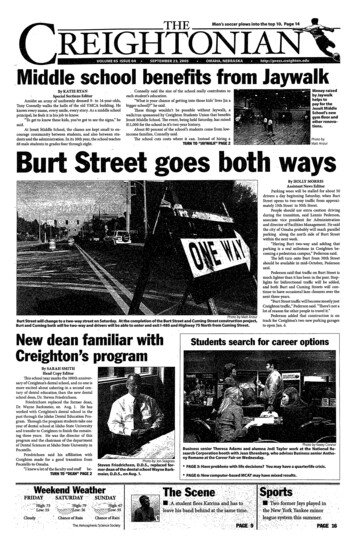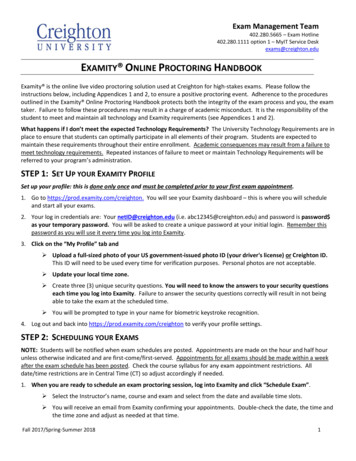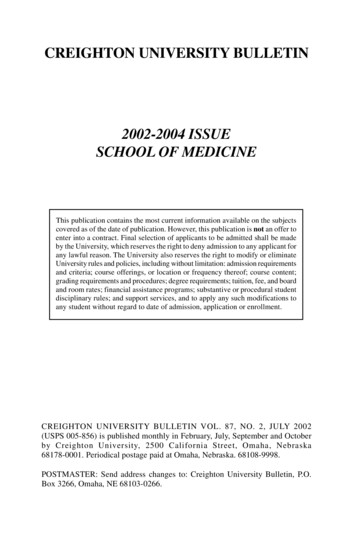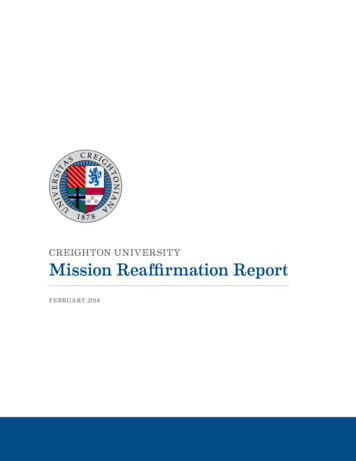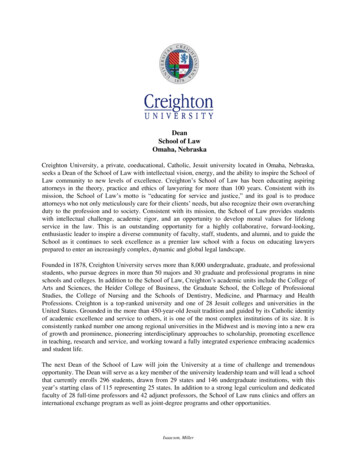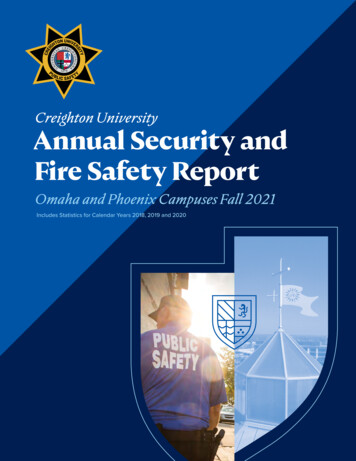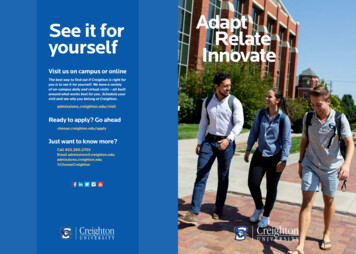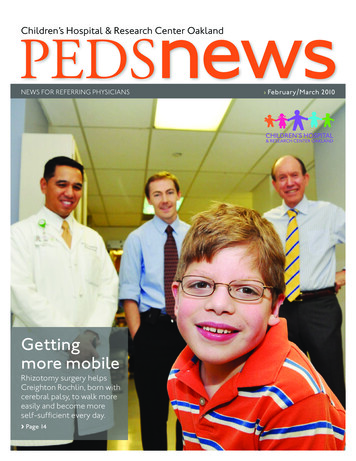
Transcription
Creighton UniversityGuide to LivingOn-CampusThe Guide to Living On-Campus is adocument that outlines importantinformation, policies and proceduresfor Creighton Universityresidential students.
Contents1.2.3.4.5.The Department of Residential LifeStaff DescriptionsOn-Call StaffStudent Leadership and RepresentationReception Desksa. Equipment Checkoutb. Personal Searches6. Access to the Residence Halls and Guest Policies7. Keys and Lockoutsa. Security and Renters Insurance8. Roommates and Room Move Procedures9. Community Living and Quiet Hours10. Public Facilitiesa. Chapel and Prayer Spacesb. Computer Roomc. Kitchensd. Study Rooms and Neutral Zonese. Laundry Room and Vending Machinesf. Bicycle Racks11. Your Rooma. Room Alterations and Damagesb. Lofts and Waterbedsc. Storaged. Cable/WIFI12. Maintenance and Facilities Requests13. Mail14. Animals15. Solicitation16. Health and Safetya. Room Checksb. Cleanlinessc. Smokingd. Sportse. Motor Vehicle Storagef. Windows, Ledges, Roofs and Balconiesg. Weapons17. Emergenciesa. Severe Weatherb. Power Outage18. Fire Safetya. Fire Alarmsb. What to Bring or Not to Bring to Campusc. Candles/Open Flamed. Holiday Decorations19. Residence Hall and Apartment Agreements20. Creighton Student Handbook
1. The Department of Residential Life (DRL)Within the Department of Residential Life, we strive to be a welcoming community for all residentsand guests and encourage students to engage in meaningful dialogue to expand their values andworld-view. Creighton University offers a class-year housing system designed to provide anexceptional opportunity for students to build community with one another and become integratedinto the greater university community. Each phase of living on campus at Creighton invites studentsto ask intentional questions about themselves and their identities, their relationship to others andhow they can become leaders in a global society. The Residential Student Competencies define thelearning, growth and development expected of residential students during their time living oncampus.The Department of Residential Life consists of 7 Resident Directors (RD’s), 1 Assistant Director (AD),and 1 Director. We also work with 7 Hall Chaplains, 3 Academic Success Peer Mentors, 4 CampusHealth Aids, 7 Assistant Resident Directors (ARDs), 2 Apartment Coordinators, and 60Resident Advisor’s (RA’s). Our work with student development is done in collaboration with ourHousing and Auxiliary Services Department, Division of Student Life staff and various other campuspartners at Creighton University.Mission and ValuesThe Department of Residential Life at Creighton University provides a class-year housing systemdesigned to provide an exceptional opportunity for students to build community with oneanother. Each phase of living on campus at Creighton involves asking students intentionalquestions about themselves, their relationship to others and as potential leaders within thecommunity.Residential Student CompetenciesThe Residential Student Competencies define the learning, growth and development expectedof residential students during their time living on campus.o Service, Faith and Justiceo Identity Establishment and Explorationo Life Skills Developmento Diversity and Inclusivityo Relationship Developmento Transitions2. Staff Descriptions Resident Director: Resident Directors (RD) at Creighton are professionals who work 10or 12-month positions and live within the residence halls. They typically supervise 4-16Resident Advisors and one Assistant Resident Director, as well as have responsibilitiesrelated to the residence hall councils, and other duties within the Department ofResidential Life. Guided by the Division of Student Life Pillars, our goal is to be a resourcefor residents, a central member of our community and serve to educate those within thecommunity to become citizens of the world. Typical things you would reach out to yourRD for include personal issues or struggles, behavioral-related conversations, how to getinvolved in hall leadership or other opportunities at the institution or issues you areunable to resolve with your Resident Advisor (RA).Apartment Coordinator: The Apartment Coordinator (AC) is a live-in, residence hallstaff member responsible for assisting the Resident Director or Assistant Director ofResidential Life with monitoring the apartment communities in Opus and Davis Halls.
They supervise the desk staff, conduct rounds and assist with roommate conflicts andother issues in the apartment communities. Typical things you would reach out to yourAC for include issues or questions about the reception desks, roommate issues andgeneral resources around campus.Assistant Resident Director: The Assistant Resident Director (ARD) is a live-in,residence hall staff member responsible for assisting the Resident Director (RD) with thesuccessful provision of services and programs in Creighton’s first year and sophomoreresidence halls. They are also responsible for managing the desk in their community, aswell as advising the Residence Hall Council (RHC). Typical things you would reach out toyour ARD for are desk-related issues or suggestions and involvement in the ResidenceHall Leadership positions.RA Lead (First Year Halls Only): The Resident Advisor Lead (RAL) is a live-in, residencehall staff member responsible for assisting the Resident Director (RD) with thesuccessful provision of services and programs in Creighton’s first year residence halls.Our Resident Advisor Lead staff serve as mentors, role models, resources and conflictmanagement experts in the residence halls. They build community through personalinteractions, programs, promoting diversity and inclusion in the community and crisisresponse. Typical things you would reach out to them for are leadership/mentorshipopportunities or other issues that your RA are unable to assist with in your community.Resident Advisor (RA): The Resident Advisor (RA) is a live-in, residence hall staffmember responsible for assisting the Resident Director (RD) with the successfulprovision of services and programs in Creighton’s first year and sophomore residencehalls. Our Resident Advisor (RA) staff serve as mentors, role models, resources andconflict management experts in the residence halls. They build community throughpersonal interactions, programs, promoting diversity and inclusion in the community andcrisis response. Typical things you would reach out to your RA for include, but are notlimited to, involvement on campus, programming ideas or resources, roommateconcerns, personal concerns or as a first point of contact for any resources the CreightonCommunity has to offer.Academic Success Peer Mentors (First Year Halls Only): Academic Success PeerMentors (ASPM’s) are upperclassmen trained to help provide academic resourcesincluding connecting you with tutoring, building schedules and time management,advice on how to communicate with faculty and more. They hold regular office hours inthe Academic Success Centers, located in all first-year residence halls.Student Health Aides: Student Health Aides (SHA) are trained student leaders who canprovide basic first aid and medical assessment on campus. This peer professional is oncall after 5:00 p.m. (and at other times when the Student Health Center is closed) toassist Residential Life staff in medical assessment and emergencies. If you have anymedical problems or concerns, contact a RA, or Public Safety.Hall Chaplains: Both Jesuits and lay ministers live among our students in the residencehalls, serving as additional supports and resources for our students. They join inmeetings with hall staff and hall government, offer programs around hospitality andspirituality, organize Catholic masses in the hall chapels and are available to be aconversation partner to journey with our students through difficult situations.Environmental Services: While you are responsible for cleaning your own room, suite orapartment, the Environmental Services staff cleans all common areas and communitybathrooms regularly. The Environmental Services staff and other residents appreciateyour cooperation and respect in keeping your community clean. It is also yourresponsibility to help keep our campus home clean, safe and comfortable to live in!Facilities Professionals: Each building has maintenance personnel responsible for theupkeep and repair of the facilities. Services you might request for repairs include, but are
not limited to, light fixtures, sinks, pest control, broken or lost keys and heating and airconditioning. To request these or other services, notify staff.Public Safety Officers: Public Safety officers can be seen patrolling areas of campus,including the residence halls, to maintain safety and a respectful environment in thecampus community. You may encounter them at programs, conducting routing walkthrough’s or addressing concerns of alcohol, drugs or other major issues in the halls.Desk Receptionist: Each residence hall has a reception desk staffed 24/7 whileresidents are living on campus. The student staff working the desk can assist you withissues such as checking in/out guests, giving you directions or resources around campus,checking out equipment or games and submitting maintenance requests for your room.3. On-Call StaffOur department provides several staff members on-call throughout the day/evening to assistyou. These staff can all be reached by contacting the reception desk in your residence hall or bycalling Public Safety. Below outlines the various staff available as a resource to you 24/7. Resident Advisor On-Call – These are student staff assigned to your residence hall, andare on duty from 5:00pm-7:00am each day/evening. It is important to note that this is arotating schedule, so your specific RA or even an RA from your building may not be theperson responding. Assistant Resident Director On-Call – These are ARD’s on-call to assist primarily withreception desk issues and staffing. Student Health Aid’s – The Health Aids are on-call from 5:00pm-7:00am, mirroring theRA’s on-call. These students respond to potential health risks/issues with students oncampus. Resident Director On-Call (RDOD) – This is a professional staff member rotation oncall 24/7/365 for campus. They respond to serious incidents on campus, as well as assistthe student staff on-call with questions, room searches or special circumstances. Campus Minister On-Call (CMOC) – The Campus Minister On-Call is a professional orgraduate student from the Campus Ministry Office, on call 24/7 during the academicyear. They serve on a rotating basis, offering pastoral care as requested by students. Counselor On-Call – This is a mental health professional on-call 24/7 from the StudentHealth Center on campus. They can be consulted by the professionals on-call to assistwith students experiencing a mental health crisis. University Responder On Call (UROC) - This is a senior professional staff memberrotation on-call 24/7/365 for campus. They serve as a consultant to the RDOD and otherstaff, and will respond on campus as needed for higher level incidents. Public Safety – Our campus Public Safety staff patrol campus 24/7/365 and work withResidential Life to address serious issues in the residence halls, or respond to students incrisis.4. Student Leadership and Representation Inter-Residence Hall Government (IRHG) – The Inter Residence Hall Government(IRHG) is the premier resident hall government on Creighton's campus. IRHG serves as avoice for all campus residents. We serve as the official channel of communicationbetween residents and university administration.o IRHG stands as a united coalition of Residence Hall Councils (RHC’s) andApartment Councils (AC’s) and we seek to improve the residential life experiencein an intentional and individualized approach.
o IRHG is proud to sponsor student activities in our residence halls and apartments.As an organization, IRHG promotes community building through programs thatcelebrate diversity and promote the social, educational and spiritual developmentof all residents.Residence Hall (and Apartment) Councils – Each residential community has aResidence Hall Council (Opus/Davis have an Apartment Council) to serve as a subsidiaryof the IRHG governing board. The councils hold programming opportunities andadvocate for updates and change in the residential communities. There are numerousleadership opportunities within each council, and elections are held in the beginning ofeach academic year.5. Reception DesksThe reception desks in the residence halls at Creighton University operate 24/7 during theacademic year and as needed for groups in the summer or break periods. The reception deskprogram exists to provide safety and services to those in the Creighton Community. While eachdesk is different, most offer services such as submitting maintenance reports, contacting stafffor assistance, checking-out cleaning or gaming equipment, renting movies and more (somedesks also have package pickup for their residents). The desks are staffed by student leadersand are trained to provide residents and guests resources and excellent customer service. Thefollowing section has information related to specific aspects of the reception desks. Equipment Check-Out: Each hall has a variety of items available for your use. All desksstock cleaning supplies such as brooms, dustpans and vacuum cleaners. Some hallsare equipped with ping pong equipment, games, kitchen supplies, jumper cables, snowshovels and ice scrapers. Check with the Reception Desk staff about availability of itemsneeded. To check-out an item, you will be required to leave your ID. If you fail to returnan item, you will be fined for the cost of replacing that item.Personal Searches: The University reserves the right to search a student or theirbelongings if a University official believes that a student is in violation of CreightonUniversity policies and/or procedures or local, state, or federal law. Furthermore, if aUniversity official believes that a student or their guest is in violation of CreightonUniversity policies and/or procedures or local, state, or federal law, the Universityofficial has the right to check any packages, book bags, boxes, duffel bags, or otheritems.oIf a University official believes that a student or their guest is in possession ofalcohol, whether by someone under age 21 or by someone of age transportingitems for the minor, the University official has the right to check any packages,book bags, boxes, duffel bags, or other items.oIn addition, University officials may inspect any person or possessions oncampus property if there is a reasonable expectation that a person is inpossession of drugs, weapons, other illegal or inherently dangerous items, orany items in violation of University policy
6. Access to the Residence Halls and Guest PoliciesResident and Guest Access between 7:00am and 9:00pm: On-Campus Residents Entering the Residence Hall or Apartment Building in WhichThey Live: Residents may swipe or present their card at the appropriate card reader togain access to their residence hall or apartment building. On-Campus Residents Entering a Residence Hall or Apartment Building in WhichThey Do Not Live: Residents may swipe or present their card at the appropriate cardreader to gain access to residence halls or apartment buildings other than their own. Non-Resident, Active Creighton ID Holder: Any non-resident individual with aCreighton ID (faculty, staff or student) can enter any residence hall by checking in withthe Reception Desk staff. They will leave their Creighton ID at the desk while they are inthe building. Active Creighton ID Holders do not need to be signed in nor escorted by aresident before 9:00pm. Any Active Creighton ID Holder unable to present theirCreighton ID, must follow the Non- Active Creighton ID Holder guidelines (see below). Non-Creighton ID Holder: Any Non-Active Creighton ID Holder may check into anyresidence hall by leaving a valid picture identification at the hall desk and after beingsigned in by their resident host who has met them at the desk. Guests must be signed inand escorted by their resident host at all times.Resident and Guest Access between 9:00pm and 7:00am: On-Campus Residents Entering the Residence Hall or Apartment Building In WhichThey Live: Residents of each hall must give their Creighton ID to the Desk Receptionist inorder to enter their residence hall. Sign in is not required. On-Campus Residents Entering a Residence Hall or Apartment Building in WhichThey Do Not Live: Any resident student may check into any residence hall by leaving theirCreighton ID at the hall desk and after being signed in by their resident host who has metthem at the desk. Guests must be checked in and escorted by their resident host at alltimes. A resident may sign in a maximum of two guests at a given time. Non-Resident, Active Creighton ID Holder: Any non-resident individual with aCreighton ID (faculty, staff or student) may check into any residence hall by leaving theirCreighton ID at the hall desk and after being signed in by their resident host who has metthem at the desk. Guests must be checked in and escorted by their resident host at alltimes. A resident may sign in a maximum of two guests at a given time. Non-Creighton ID Holder: Any non-active Creighton ID Holder may check into anyresidence hall by leaving a valid picture identification at the hall desk and after beingsigned in by their resident host who meets them at the desk. Guests must be signed inand escorted by their resident host at all times. A resident may sign in a maximum of twoguests at a given time. Guests of Opposite Sex: Guests of the opposite sex are never permitted to remain in aroom or in a residential area between 1:00 AM and 7:00 AM on Mondays through Fridays.On Saturdays, Sundays and holidays, guests of the opposite sex are never permitted toremain in a room or in a residential area between 3:00 AM and 7:00 AM. Any resident whowould like to have a non-resident of the same sex remain in their room overnight mustregister them as an overnight guest with staff at each residence hall’s reception desk. Astudent may check in a maximum of two guests at a given time, and no guest is allowed tostay overnight for an extended period of time. Hosting residents must escort their guestsat all times and will be held responsible for the conduct of their guests at all times. TheUniversity does not assume responsibility for personal accident, injury or illnesssustained or caused by residents or guests of residents.
Exceptions: University Staff: Any university staff member whose job responsibilities requirehim/her to access the residence halls or apartments will be granted card access tothe appropriate buildings without needing to sign-in, leave identification or have aresident escort. Approved staff members may include, but are not limited to:Department of Residential Life staff, Division of Student Life personnel, PublicSafety officers, Facilities Management staff and their contractors and ITLS staff andtheir contractors. Parents and Family Members: Resident students may invite parents and familymembers to be their guests in the Residence Halls. While typically family would beclassified as “Non-Active Creighton ID Holders,” exceptions to this may be madefor: move-in weekend and move-out weekend. During these times, parents andfamily members will not need to sign-in or leave an ID at the hall desk; however,they must be escorted while in the building by their student. Break Periods: To maintain security in the halls during break periods, onlyresidents attempting to enter the residence hall or apartment building in which theylive will be granted card access. All others, including on-campus residentsattempting to enter a residence hall or apartment building in which they do not live,must sign-in and be escorted by a resident while in the building, leaving a validpicture ID at the desk. Break periods include: Fall Break, Thanksgiving, SpringBreak and Easter. With the exception of Opus Hall and Davis Square, all other hallsare closed during Christmas break.Guest Hosting Policy for Upper-class Housing (Davis Square and Opus Hall): Any resident of Davis Square and Opus Hall who wishes to have a guest must meet theirguest at the Reception desk and escort their guest at all times while within the building. Ifa guest is meeting with multiple people within the hall, he/she should be escortedbetween rooms by a resident. All guests who are in the building without a resident hostwill be removed from that building. A resident may check in a maximum of two guests ata given time.7. Keys and LockoutsWhen you check into the residence halls, you are issued one room key and, in some halls, amailbox key. You should keep your keys with you at all times. If you lose your room key, it isnecessary to change the lock on your room to ensure that your room is secure. The cost for thisservice is 45.00 in all residence halls (except McGloin and Heider Halls where the cost for thisservice is 90.00 due to the multiple doors the keys open). This process takes approximatelytwo days and once completed, you may pick up your new keys at the Reception Desk. If you loseyour mail key, contact the Reception Desk to order a new key. The replacement fee is 15.00.It is prohibited to duplicate any University key, including the key for your residence hall. If youbreak a room or mailbox key, bring both portions of the broken key to the Reception Desk. Anew key will be ordered at a charge of 10.00. If you notice that your key is bent, please bringthe key to the Reception Desk and it will be replaced at no charge. It is important to let theReception Desk know within 48 hours if your key(s) is/are lost, stolen or broken. Earlynotification can greatly reduce the time you need to wait for a replacement key, as well asminimize the safety risk. All charges cover exactly the cost of lock and/or key replacement.
You should never leave your room unlocked even for a few minutes. Any student who isresponsible for the unauthorized possession or use of University keys will be subject to seriousbehavioral misconduct action.When you checked into the hall, you signed your name on a “Lock-out Key Policy andProcedure” card. The desk receptionist uses this card to check out a lock-out key to you duringthe course of the year. Lock-out keys are available only to those registered to live in a specificresidence hall room. The policy on lock-out keys follows: Each room has one lock-out keyavailable at the desk for use by the assigned occupant(s) of that room. To check out a key, youmust present a valid Creighton ID to the desk receptionist. If your ID is locked in your room youmay have to present other information or be let into your room by residence hall staff. The feefor a lock-out key is 1.00, and the key must be returned to the Reception Desk within one hour.Failure to return the lock-out key within 24 hours will result in a 5.00 fine. If the lock-out key isnot returned within 24 hours, the key will be considered lost, and a lock change will be ordered.To ensure the safety and security of residents and their belongings, anyone attempting to checkout a key to any room other than their own will be subject to behavioral misconduct action.Your student ID will serve as your key to access your residence hall. All students are required toswipe or present their ID before entering their assigned hall. Failure to have your university IDwill prevent you from being able to enter the hall, and you will need to check in at the desk togain access to the building. You are able to check in through the desk two times withoutpenalty; followed by three instances which each incur a 1.00 fine, and each additional instanceof not having your ID when entering the building will result in a 5 fine.Apartment Keys – In Opus and Davis, your Creighton ID will serve as your apartment “key.” Youwill also have the option of acquiring an actual key to your individual bedroom within theapartment. Lockout cards (for the apartments) and keys (for the bedrooms) are provided at theReception Desk, according to the same checkout policy as described above for the residencehalls. There is a 5 fee for checking out a lockout card and a 20 fine if the card is not returnedwithin 1 hour. If you lose or break your ID card and get a replacement card, you will need tocontact your Apartment Coordinator to arrange to have the new card number activated for yourdoor.Security and Renters Insurance – It is your responsibility to keep your room and belongingssecure. If you have a faulty window or door lock, please submit a maintenance request as soonas possible. The University does not assume responsibility for damage to student property dueto theft, fire, water or other causes. Consequently, the University encourages all students totake valuables with them when they leave for holidays, breaks or other extended periods. Yourinsurance policy is your only protection against such loss. If your family policy does not apply,you may wish to consider a personal property insurance package. Register your bicycle withPublic Safety. Failure to do so makes it difficult to verify the owner if the bike is stolen andsubsequently recovered. Report any loss immediately to your Residential Life Staff and PublicSafety. Report immediately any suspicious persons or activities you see by calling yourReception Desk. You are responsible for the safety and security of your personalpossessions. Take steps now to prevent situations in the future.
8. Roommates and Room Move ProceduresThe Residential Life team strongly believes in the value of learning to live with anotherindividual in the community. We believe that this challenges you to work together to developrespect, consideration and understanding for one another. We suggest that you discuss suchthings as sleep and study hours, cleaning arrangements, appropriate times for visitors and use ofone another’s possessions with your roommate early in the year or prior to your arrival oncampus.To support the primary goal of a healthy living and learning environment, the Residential Lifestaff supports all efforts made towards reasonable use of the room, including but not limitedto the ability to sleep, study and have a safe and respectful living environment in yourcommunity. The Roommate Agreement is the primary tool used by the Resident Advisors andResident Directors in addressing issues or concerns between roommates.Conflicts between roommates can revolve around many issues. You are strongly encouragedto discuss the many issues surrounding living and learning in the residence halls before theybecome an issue. When conflicts arise, residents are expected to attempt to resolve personalconflicts on their own. If a conflict has reached an impasse, the Resident Advisor or ResidentDirector will act as a mediator. They will provide fair opportunities for you and your roommateto share your concerns with each other and work jointly to develop a strategy for managing theconflict. The Roommate Contract and any other prior agreements between you and yourroommate serve as tools in resolving this conflict. The process of conflict resolution isongoing and does not end with the formal mediation. Both roommates are mutuallyresponsible for following up on all points in any agreement. Often, new issues will arise, andyou and your roommate may need to add to your current agreement with the assistance ofResidential Life staff.All residents are expected to adhere to community standards in the Student Handbook at alltimes. In any conflict that involves a violation of University or Residence Hall communitystandards, the resident responsible for the violation may be subject to behavioral misconductmeeting action including, but not limited to, sanctioned mediations, educational sanction, etc.In extreme cases a mandated or immediate room change could take place.To Request a Room Change – If you would like to request a room change, you must firstreach out to your Resident Advisor (RA) to schedule a time to discuss the circumstancessurrounding your request. If the move is related to your roommate, they may also request amediation between the members of the room. Depending on the success of this meeting, theResident Director (RD) may become involved and attempt to gather more information orrectify the situation. If no resolution or solution can be made, the RD will then work with theHousing Assignments staff to identify potential available rooms. It will then be up to you toweigh your options and determine a next step. All information is subject to change and theremay be time limits or parameters to make decisions. Also, because of increasing enrollment,there are often not additional, or very limited, options for a room move. Ultimately, theResidential Life and Housing & Auxiliary Services staff will take into consideration safety,environment and availability to help make this process as easy and quickly as possible.
9. Community Living and Quiet HoursLiving in a community of peers is a privilege that not many people often get to experience, andwe hope you take advantage of all of the excitement, spaces and other opportunities thatcome with this experience. However, there can also be challenges when moving into a groupof people and sharing space. Below we have outlined our expectations for living in thiscommunity on campus at Creighton University.Individuals – While living with your peers, you will have an opportunity to meet students whoshare your values and interests and others who do not. We hope that you will take theopportunity to experience and accept the vast diversity in the beliefs, values, backgrounds,experiences and customs of other students. Floormates, like roommates, are challenged towork together to develop respect, unders
partners at Creighton University. Mission and Values The Department of Residential Life at Creighton University provides a class-year housing system designed to provide an exceptional opportunity for students to build community with one another. Each phase of living on campus at Creighton involves asking students intentional
